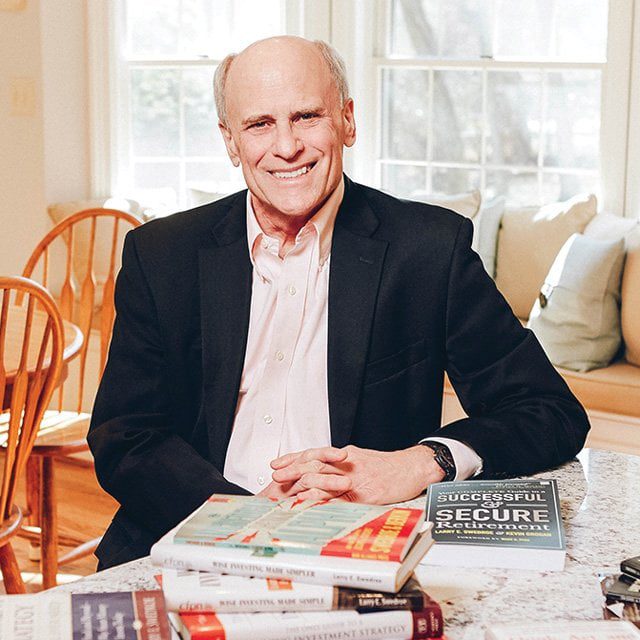Larry Swedroe: Time to Diversify From Stocks and Bonds

“The markets are expecting the Fed to cut [interest] rates in 2023. That’s where the preponderance of risk is,” Larry Swedroe, head of financial and economic research at Buckingham Strategic Wealth, tells ThinkAdvisor in an interview.
As for investors, he warns that they need to determine what sort of risk they’re “willing to take and make sure their portfolio doesn’t take on more than they can stomach. Otherwise, they’re likely to panic and sell.”
In the interview, Swedroe also offers his forecasts for corporate earnings (the market is “overestimating them”), stock and bond market returns (“mediocre to slightly poor”) and U.S. economic growth (“very moderate”).
He sees no recession in the first half of next year but one in sight possibly for the second half.
As for inflation, “It will be harder for the Fed to bring inflation to their 2% target for several years,” he contends.
Prior to joining Buckingham in 1996, Swedroe, a member of the firm’s investment policy committee, was vice chairman of Prudential Home Mortgage and vice president and regional treasurer at Citicorp.
In our conversation, he opined about bitcoin (“pure speculation”) and blockchain technology (“game-changing”).
Swedroe, based in St. Louis, strongly recommends alternative investments as a tack to “diversify away from traditional stock and bond portfolios,” a move designed to “trade off risks.”
ThinkAdvisor interviewed Swedroe by phone on Dec. 13. The author’s ninth book is “Your Essential Guide to Sustainable Investing” (2022), co-written with Samuel C. Adams.
Here are highlights of our interview:
THINKADVISOR: What’s your forecast for the stock market in 2023?
LARRY SWEDROE: I’m neither bullish nor bearish. I think stocks and bonds are going to have mediocre-to-slightly poor returns over the next year.
Value, especially small value, has more safety built in because [such stocks] are trading at much lower valuations; whereas, if the markets get [slammed], growth stocks are where the biggest hits could be.
Such as technology?
Yes. Anything that’s a high P/E-type stock because they get hurt the most when interest rates go up.
What should investors do now in working with their portfolios?
The first thing they should do is to ignore all economic forecasts.
They should just think about risk, diversification, look at what kind of risk they’re willing to take and make sure their portfolio doesn’t take on more than they can stomach.
Otherwise, they’re likely to panic and sell.
They need to have a good financial plan. Right?
Investors should have a well-thought-out plan and regularly be rebalancing and tax loss harvesting as opportunities arise. They should stay the course, stick with their plan and review it every year as their assumptions change.
Assumptions include bond yields and expected stock returns.
What do you foresee for 2023 corporate earnings?
My view is that the market is overestimating [them]. The latest forecasts are for something like $230 a share for the S&P.
I wouldn’t be surprised if they came in quite a bit lower than that.
You could see a significant squeeze on corporate profits.
What do you expect for economic growth, then?
It should be very moderate because of the Fed tightening and shrinking its balance sheet.
The odds are reasonable that the economy stays a little hotter than maybe the Fed would like because, with the strong labor market, consumer spending is going to hold up.
That means it will be harder for the Fed to bring inflation to their 2% target for several years.
Do you see a recession coming next year?
I don’t think we’re going to get a recession in the first half because unemployment is so low. Both consumer and corporate balance sheets are strong.
Even as the economy has slowed, companies have been reluctant to lay off workers. That’s going to keep consumer spending up.
But trillions of dollars have been wiped out by the crypto debacle, and we’ve had stock and bond bear markets on top of it. All that could suppress consumer spending through the wealth effect [people spend more if they feel rich].
The economy could be a bit stronger, especially in the first half. However, if the Fed has to tighten more because inflation doesn’t come down, we might see a recession in the second half or later.
What shapes that thinking?
The balance of power has dramatically shifted: The last decade it was with employers, and real wages didn’t do well.
Now the balance of power has shifted strongly to employees. That means workers have more bargaining power, and corporate profit margins will be squeezed.
What are some of your additional thoughts about inflation?
Goods inflation is coming way down, which you’re seeing in the CPI [Consumer Price Index] numbers. But goods are only one-third of consumption spending. Services are the other two-thirds.
And with the tight labor market, its going to be hard for that to really come down.




